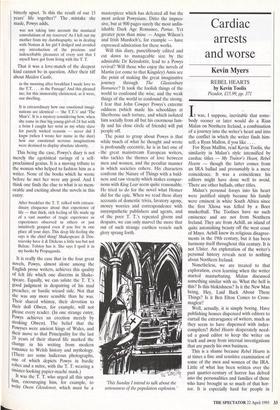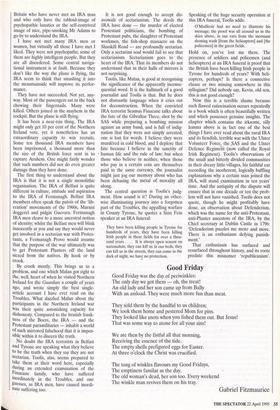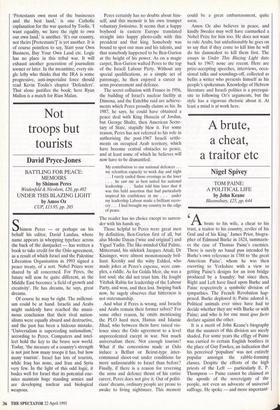Cardiac arrests and worse
Kevin Myers
REBEL HEARTS by Kevin Toolis Picador, £15.99, pp. 371 It was, I suppose, inevitable that some- body sooner or later would do a Rian Malan on Northern Ireland, a combination of a journey into the writer's heart and into the conflict in which the writer finds him- self; a Ryan Mallon, if you like . . . .
For Ryan Mallbn, read Kevin Toolis, the similarity in Malan's style intensified by cardiac titles — My Traitor's Heart, Rebel Hearts — though the latter comes from an IRA ballad and presumably is a mere coincidence. It was a coincidence his editors might have done well to avoid. There are other ballads, other titles.
Malan's personal forays into his heart were justified simply because his family were eminent in white South Africa since the first Xhosa was felled by a Boer musketball. The Toolises have no such eminence and are not from Northern Ireland. They are from Achill, an island of quite astonishing beauty off the west coast of Mayo. Achill knew its religious disagree- ments in the 19th century, but it has been harmony itself throughout this century. It is not Ulster. An exploration of the writer's personal history. reveals next to nothing about Northern Ireland.
Nonetheless, we are treated to that exploration, even learning when the writer started masturbating. Malan discussed something similar with us. What the hell is this? Is this blokishness? Is it the New Man being, Hey, Laid Back About These Things? Is it Ben Elton Comes to Cross- maglen?
Well, actually, it is simply boring. Have publishing houses dispensed with editors to curtail the extravagance of writers, much as they seem to have dispensed with index- compilers? Rebel Hearts desperately need- ed a good editor to keep the writer on track and away from internal investigations that are purely his own business.
This is a shame because Rebel Hearts is at times a fine and sensitive examination of some of the men and women of the IRA. Little of what has been written over the past quarter-century of horror has delved into the personalities and families of those who have brought us so much of that hor- ror. It is especially hard for people in Britain who have never met an IRA man and who only have the tabloid-image of psychopathic lunatics or the self-contrived image of nice, pipe-smoking Mr Adams to go by to understand the IRA.
I have not met many IRA men or women, but virtually all those I have met I liked. They were not psychopaths; some of them are highly intelligent people. But they are all disordered. Some central naviga- tional instrument is at fault. Because they don't like the way the plane is flying, the IRA seem to think that smashing it into the mountainside will improve its perfor- mance.
They have not succeeded. Not yet, any- way. Most of the passengers sat in the back chewing their fingernails. Many were killed. Others joined in the mayhem in the cockpit. But the plane is still flying.
It has been a near-run thing. The IRA might only get 10 per cent of the Northern Ireland vote, yet it nonetheless has an extraordinary capacity to win recruits. Some ten thousand IRA members have been imprisoned, a thousand more than the size of the British force sent in to capture Arnhem. One might fairly wonder that such numbers did not do even greater damage than they have done.
The first thing to understand about the IRA is that it is not a single monolithic organisation. The IRA of Belfast is quite different in culture, attitude and aspiration to the IRA of Fermanagh. Belfast IRA members often speak the patois of the 'lib- eration' movements of the 1960s, Marxist doggerel and pidgin Guevara. Fermanagh IRA men cleave to a more ancestral notion of identity; whilst the Belfast men will blink innocently at you and say they would never get involved in a sectarian war with Protes- tants, a Fermanagh Provo would assume that the purpose of the war ultimately was to get Protestant Planters off the land siezed from the natives. By hook or by crook.
By crook mostly. This brings us to a problem, and one which Malan got right to the, well, heart of when he visited Northern Ireland for the Guardian a couple of years ago, and wrote simply the best single- article account I have ever read on the Troubles. What dazzled Malan about the participants in the Northern Ireland war was their quite astonishing capacity for dishonesty. Compared to the brutish frank- ness of the Boers, the IRA — and the Protestant paramilitaries — inhabit a world of such mirrored falsehood that it is impos- sible within it to discern the truth.
No doubt the IRA terrorists in Belfast and Tyrone are speaking what they believe to be the truth when they say they are not sectarian. Toolis, alas, seems prepared to take them at their word here, especially during an extended examination of the Finucane family, who have suffered inordinately in the Troubles, and one guesses, as IRA men, have caused inordi- nate suffering too. It is not good enough to accept dis- avowals of sectarianism. The deeds the IRA have done — the murder of elected Protestant politicians, the bombing of Protestant pubs, the slaughter of Protestant workmen, the fish-shop massacre on the Shankill Road — are profoundly sectarian. Only a sectarian soul would fail to see that sectarianism. Sectarianism goes to the heart of the IRA. That its members do not understand that in their halls of mirrors is not surprising.
Toolis, like Malan, is good at recognising the significance of the apparently inconse- quential word. It is the hallmark of a good journalist and Toolis is that. But he does not dismantle language when it cries out for deconstruction. When the convicted IRA terrorist Seamus Finucane talks about the fate of the Gibraltar Three, shot by the SAS while preparing a bombing mission against an army band, and is full of indig- nation that they were not simply arrested, one is lost for words. I believe they were murdered in cold blood, and I deplore that fate because I believe in the sanctity of human life and the rule of law; but when those who believe in neither, when those who pay in a certain coin are themselves paid in the same currency, the journalist might just jog our memory about who has been debasing the metal of morality all along.
The central question is Toolis's judg- ment. How sound is it? During an other- wise illuminating journey into a forgotten part of the Troubles, the appalling warfare in County Tyrone, he quotes a Sinn Fein speaker at an IRA funeral:
They have been killing people in Tyrone for hundreds of years, they have been killing Irish people in these fields for over a thou- sand years . . . . It is always open season on nationalists, they can kill us in our beds, they can kill us in the streets, they can come in the dark of night, we have no protection.
Speaking of the huge security operation at this IRA funeral, Toolis adds:
O'Muilleoir had no need to illustrate his message; the proof was all around us in the skies above, in our ears from the incessant droning wash [from the helicopters] and [the policemen] in the green fields.
Hold on, you've lost me there. The presence of soldiers and policemen (and helicopters) at an IRA funeral is proof that the British have been killing Irish people in Tyrone for hundreds of years? With heli- copters, perhaps? Is there a connective clause or two missing somewhere in this syllogism? Did nobody say, Kevin, old son, this is not good enough?
Now this is a terrible shame because such flawed ratiocination occurs repeatedly in a book which is often beautifully written and which possesses genuine insights. The chapter which contains the irksome, silly lemma above is in fact one of the best things I have ever read about the rural IRA and its fiendish, terrible war with the Ulster Volunteer Force, the ,SAS and the Ulster Defence Regimetit (now called the Royal Irish Regiment). Toolis's observations of the small and bitterly divided communities in their dreary little villages, his faithful ear recording the incoherent, logically baffling explanations why a certain man joined the IRA, will stand examination in ten years' time. And the antiquity of the dispute will ensure that in one decade or ten the prob- lem will not have vanished. Toolis does not quote, though he might profitably have done, an observation about Defenderism, which was the name for the anti-Protestant, anti-Planter ancestors of the IRA, by the Chief secretary at Dublin Castle in 1796: Defenderism puzzles me more and more. There is an enthusiasm defying punish- ment.'
That enthusiasm has surfaced and resurfaced throughout history, and its roots predate this misnomer 'republicanism'.
Good Friday
Good Friday was the day of periwinkles: The only day we got them — oh, the treat!
An old lady and her son came up from Bally With an assload. They were much more fun than meat.
They sold them by the handful to us children; We took them home and pestered Mom for pins.
They looked like snots when you fished them out. But Jesus!
That was some way to atone for all your sins!
We ate then by the fistful all that morning, Receiving the essence of the tide.
The empty shells prefigured eggs for Easter. At three o'clock the Christ was crucified.
The tang of winkles flavours my Good Fridays, The emptiness familar as the day.
The old woman's dead, her son too. Every weekend The winkle man revives them on his tray.
Gabriel Fitzmaurice
`Protestants own most of the businesses and the best land,' is one Catholic explanation for the war quoted by Toolis. 'I want equality, we have the right to own our own land,' is another. 'It's our country, not theirs [Protestants']' is yet another. It is of course pointless to say, Start your Own Business, Buy Your Own Land etc. Logic has no place in this tribal war. It will exhaust another generation of journalists sooner or later. In the meantime, every sin- gle lefty who thinks that the IRA is some progressive, anti-imperialist force should read Kevin Toolis's chapter 'Defenders'. That alone justifies the book; here Ryan Mallon is a match for Rian Malan.




























































 Previous page
Previous page